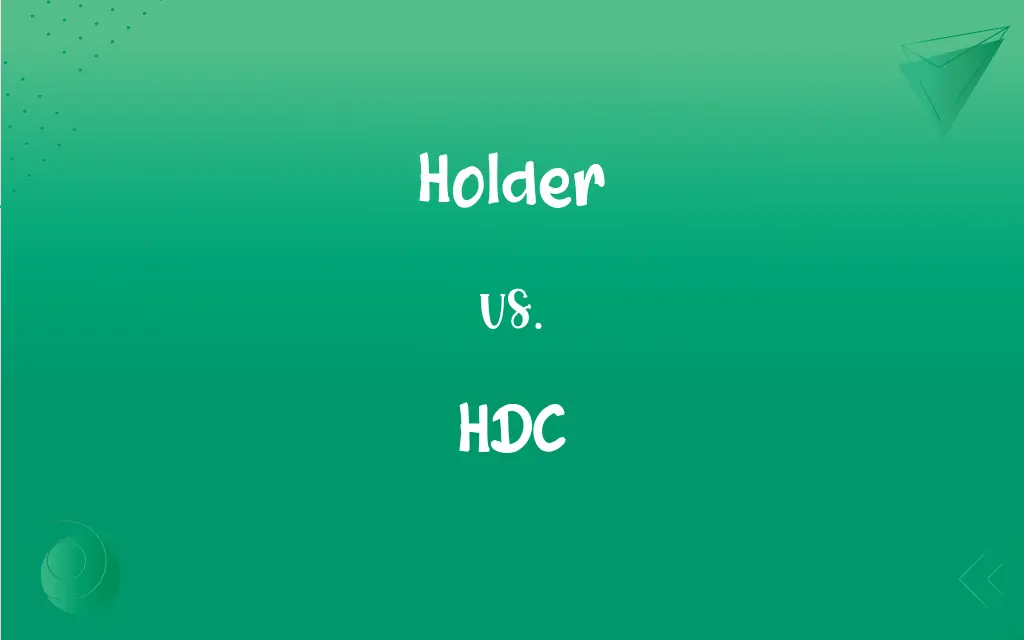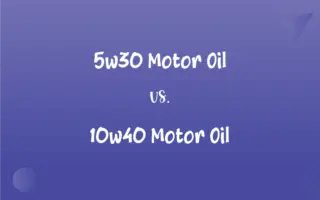Holder vs. HDC: What's the Difference?
Edited by Aimie Carlson || By Janet White || Published on March 10, 2024
A Holder is anyone in possession of a negotiable instrument, while a Holder in Due Course (HDC) is a special type of holder who acquires the instrument under specific conditions for value, in good faith, and without notice of defects.

Key Differences
A Holder is an individual or entity that legally possesses a negotiable instrument, such as a check or promissory note. Conversely, an HDC not only possesses the instrument but also meets additional criteria under the Uniform Commercial Code, like acquiring it for value.
The Holder of a negotiable instrument has certain rights, like the right to transfer the instrument. An HDC, however, enjoys greater protection under the law, such as immunity from certain defenses that could be raised against an ordinary holder.
Any Holder can become an HDC if they acquire the instrument without notice of any dishonor, claim, or defect. On the other hand, an HDC must have taken the instrument in good faith and without knowledge of any issues that could impair its value.
Holders are subject to defenses that can be raised by the original parties to the instrument, while HDCs are insulated from many of these defenses, providing them a stronger claim to the instrument's value.
The status of an HDC is often determined through the examination of the transaction's nature and the holder's conduct. For a regular Holder, possession of the instrument is the primary requirement, without the need for examining the transactional context.
ADVERTISEMENT
Comparison Chart
Definition
Possessor of a negotiable instrument
Possessor who acquires the instrument under special conditions
Legal Protection
Standard rights and subject to certain defenses
Greater protection, immune to many common defenses
Requirements
Simply holding the instrument
Acquiring for value, in good faith, without notice of defect
Rights
Transfer and enforce the instrument
Transfer, enforce, and greater claim against defenses
Good Faith Requirement
Not necessary
Necessary for acquiring HDC status
ADVERTISEMENT
Holder and HDC Definitions
Holder
A Holder has the right to transfer the instrument to another party.
As the Holder of the promissory note, she endorsed it to her sibling.
HDC
An HDC must take the instrument in good faith, for value, and without notice of any issue.
She qualified as an HDC because she purchased the promissory note without knowing its dispute.
Holder
The Holder is the current possessor of a financial document like a draft or check.
The company became the Holder of the bill of exchange after delivery.
HDC
An HDC acquires the negotiable instrument under specific legal conditions.
As an HDC, he was protected against the personal defenses of the issuer.
Holder
A Holder is someone who possesses a negotiable instrument legally.
John, the Holder of the check, went to the bank to cash it.
HDC
An HDC is protected from many defenses that can be raised against an ordinary holder.
Despite the issuer's bankruptcy, as an HDC, she was able to claim the note's full value.
Holder
A Holder is subject to the defenses that the original parties to the instrument might raise.
The Holder faced a dispute over the instrument's authenticity.
HDC
An HDC has a stronger claim to the instrument compared to a regular holder.
The court ruled in favor of the HDC, disregarding the issuer's claim of fraud.
Holder
A Holder can enforce the instrument according to the terms written on it.
The Holder of the bond claimed its value upon its maturity.
HDC
For HDC status, the holder must acquire the instrument before it's overdue and without apparent defects.
He became an HDC as he accepted the check without knowing it was post-dated.
Holder
An owner
The holder of the copyright.
HDC
(crochet) half double crochet
Holder
A possessor or occupier
The holder of an Olympic record.
The holder of a cabinet post.
HDC
(genetics) The headcase gene.
FAQs
What defines an HDC?
An HDC is a holder who acquires the instrument under specific legal conditions for value, in good faith, and without knowledge of its defects.
What rights does a Holder have?
A Holder can transfer and enforce the instrument according to its terms.
Who is a Holder?
A Holder is anyone in legal possession of a negotiable instrument.
Do Holders have the same legal protection as HDCs?
No, HDCs enjoy greater legal protection and are immune to many defenses against ordinary holders.
What is required for someone to be a Holder?
Simply being in possession of the negotiable instrument is enough to be a Holder.
Are HDCs protected against claims of fraud?
Generally, HDCs are protected against personal defenses like fraud if they took the instrument without knowledge of such issues.
How does one acquire HDC status?
By obtaining the instrument for value, in good faith, and without notice of any legal impediments.
Does a Holder need to know the history of the instrument?
No, a Holder doesn't necessarily need to know the instrument's history, unlike an HDC.
Can any Holder become an HDC?
Yes, if they meet the criteria of acquiring the instrument for value, in good faith, and without notice of any defects.
Can an HDC be subject to certain legal defenses?
An HDC is generally protected against many common defenses, though not all.
Can an HDC face challenges in enforcing an instrument?
It's less likely, as HDCs have stronger claims and greater legal protection.
What happens if an HDC acquires an instrument with knowledge of defects?
They may lose their HDC status and the associated protections.
Are HDCs common in financial transactions?
Yes, especially in commercial transactions involving negotiable instruments.
Can an HDC transfer their status?
An HDC can transfer the instrument, but the transferee must independently meet the HDC criteria.
Is good faith acquisition mandatory for an HDC?
Yes, acquiring the instrument in good faith is a crucial requirement for HDC status.
Can a Holder enforce a negotiable instrument?
Yes, a Holder can enforce the terms of the instrument.
What types of instruments can a Holder possess?
A Holder can possess checks, promissory notes, drafts, or other negotiable instruments.
Can a Holder be liable for the instrument's past disputes?
Yes, Holders are subject to the defenses that original parties might raise.
Is the concept of HDC applicable in all legal systems?
HDC principles are primarily applicable in jurisdictions following the Uniform Commercial Code or similar laws.
What's the significance of being an HDC?
It provides greater assurance and legal standing in enforcing the rights of the instrument.
About Author
Written by
Janet WhiteJanet White has been an esteemed writer and blogger for Difference Wiki. Holding a Master's degree in Science and Medical Journalism from the prestigious Boston University, she has consistently demonstrated her expertise and passion for her field. When she's not immersed in her work, Janet relishes her time exercising, delving into a good book, and cherishing moments with friends and family.
Edited by
Aimie CarlsonAimie Carlson, holding a master's degree in English literature, is a fervent English language enthusiast. She lends her writing talents to Difference Wiki, a prominent website that specializes in comparisons, offering readers insightful analyses that both captivate and inform.































































